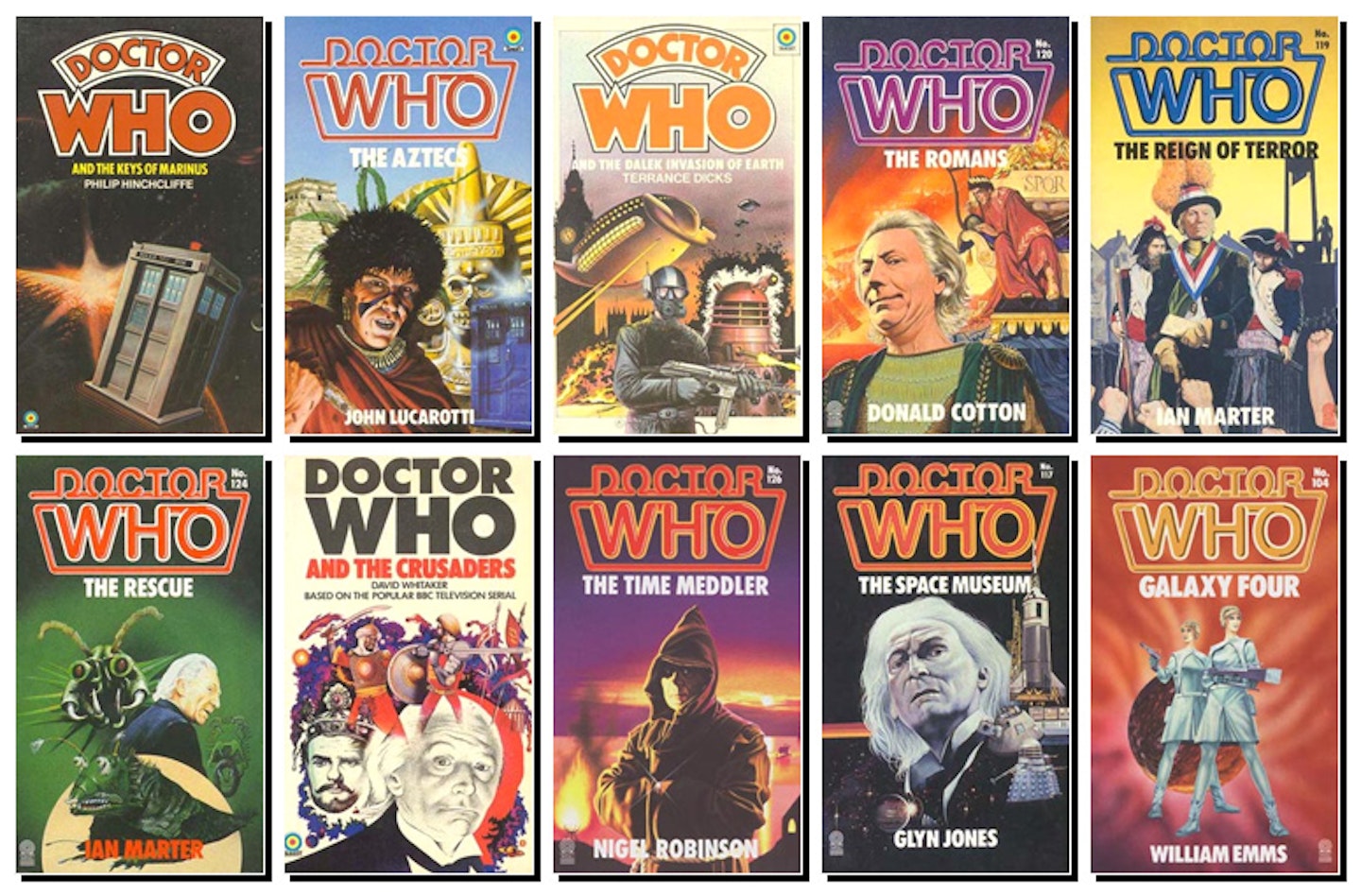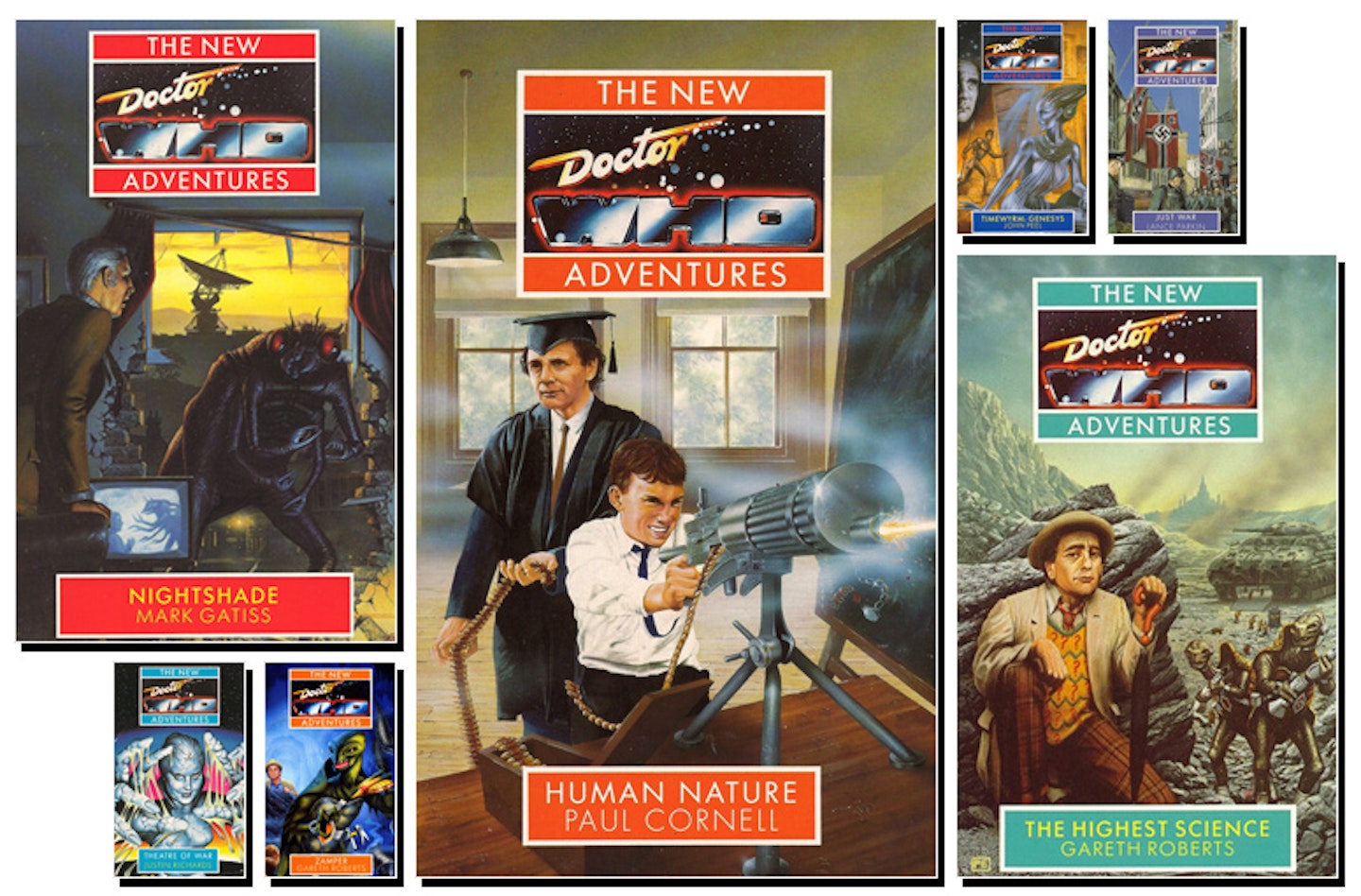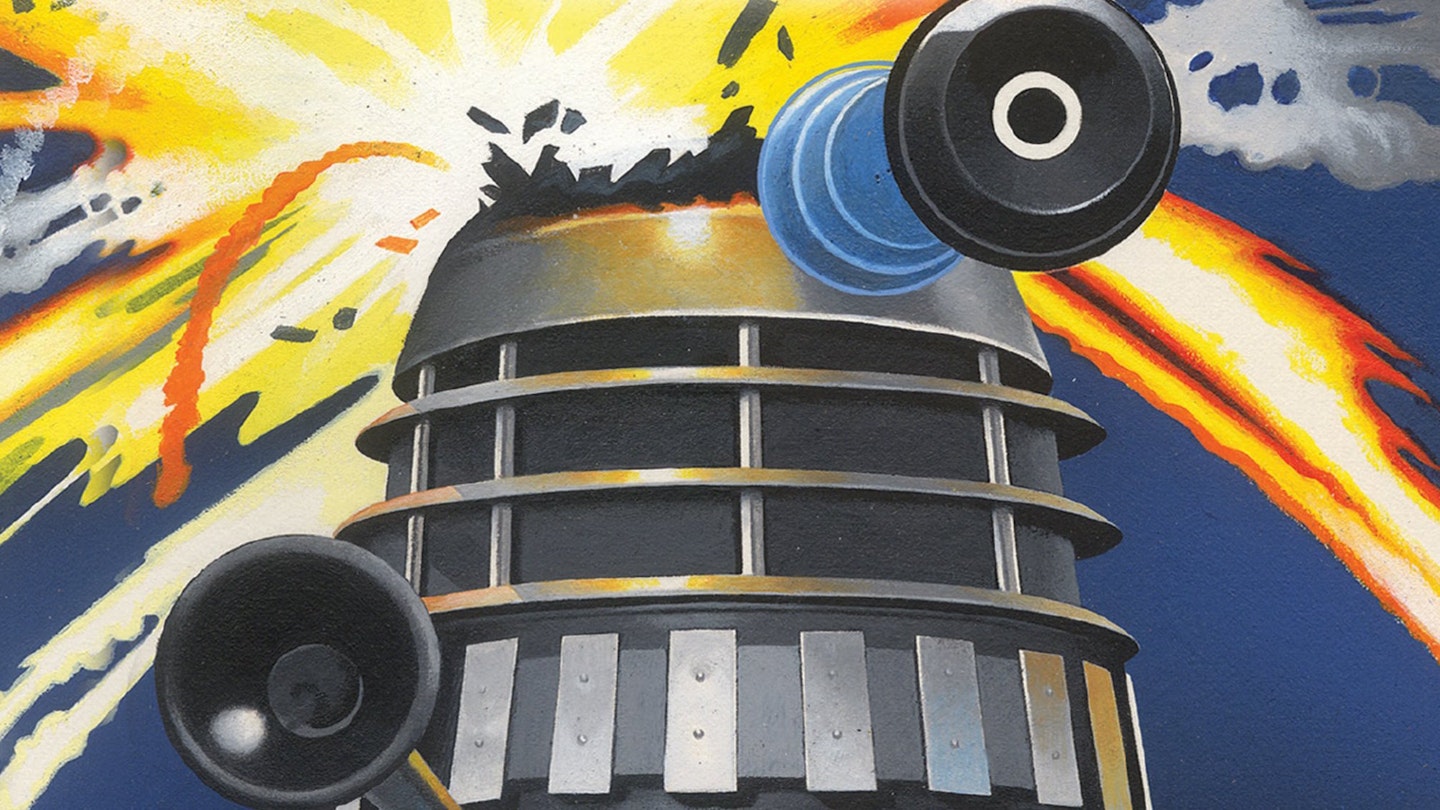The Doctor has graced our television screens – and occasionally the big-screen – for 50 years this month, but given that he’s lived for 900-odd years those episodes chronicle only a fraction of his adventures. To fill in the blank spots there are a wealth of novelisations and original stories featuring all his different incarnations (so far) and a host of excitement that the BBC special effects budgets of the ‘70s and ‘80s would struggle to deliver. Here’s our guide to the pages of Gallifrey…
Target Books' Novelisations

Target’s range of novelised TV stories was a publishing phenomenon in the ‘70s and ‘80s and was much beloved of the pre-video generations. Back then you could only imagine what previous Doctors’ adventures had looked like. These things filled the gaps tremendously, often leading to huge disappointment in the actual TV originals when they surfaced on video.
The first book in the range, David Whittaker’s Doctor Who In An Exciting Adventure With The Daleks (later – thankfully - shortened to just Doctor Who And The Daleks) was actually written for a different company, Frederick Muller, as were its immediate successors Doctor Who And The Zarbi and Doctor Who And The Crusaders. Bought up and republished by Target in 1973, they kicked off a range of a further 160 books that were still being published in 1991. Every TV story, barring three by Douglas Adams and two by Eric Saward, got the Target treatment. There was also a short-lived attempt at a spin-off range of standalone original novels about The Doctor’s companions (Turlough and Harry Sullivan were ultimately the only candidates picked) and a trio of novelisations of unmade scripts from the cancelled 1986 TV season.
Author of more than sixty of Target’s novels was legendary former script editor Terrance Dicks, still much loved within fandom for repeated descriptions like the TARDIS’ “wheezing, groaning sound”. As the elder statesman of Doctor Who fiction, he continued to get invited to contribute to the later Virgin and BBC ranges - commissioned by his former readers.
If you only read one: At the risk of seeming disloyal to Terrance Dicks, it has to be Donald Cotton’s hilarious The Myth Makers. The First Doctor gets involved in the siege of Troy, and epic poet Homer is the first-person narrator.
Virgin's New Adventures

Virgin bought Target in 1989 (the year the original TV series was finally axed) and with nothing left to novelise, got permission from the BBC to start producing original fiction. The result was The New Adventures, an intriguing range reflecting a series that had grown up with its audience. These weren’t kids’ tie-in novels but, on the whole, proper science fiction for adults, chronicling the continuing travels of Sylvester McCoy’s Seventh Doctor. “Stories too broad and deep for the small screen” was the official line.
Having started on television with a clownish persona, McCoy’s Doctor had become progressively darker across his three seasons, and The New Adventures ran with that incarnation, the manipulative “Time’s Champion”. There was more moral ambiguity, more violence, and some sex (although it wasn’t all serious: Dave Stone’s Sky Pirates is a Terry Pratchett pastiche, and Andy Lane’s All Consuming Fire mixes Sherlock Holmes and the Cthulhu Mythos). Grange Hill reject Ace had a story arc where she left the Doctor for three years and then came back an amazon. Perhaps the range’s greatest success was in introducing entirely new companions: “Adjudicators” (think 2000AD’s Judges) Roz Forrester and Chris Cwej, and, brilliantly, chaotic interstellar archaeologist Bernice “Benny” Summerfield, who arrives in Paul Cornell’s Love And War.
Along with Cornell, other New Adventures authors who got their start here and continued on to involvement with the revivified series include Mark Gatiss, Gareth Roberts, and a certain Russell T. Davies. The series ran for 61 books, 59 about McCoy, and the last, The Dying Days, handing over to Eighth Doctor Paul McGann. As an experiment, Nigel Robinson’s Birthright didn’t feature The Doctor at all, and after the BBC took back the rights The New Adventures continued for a time as a Doctor-less series centred on Benny. The low-print-run final novels with The Doctor (Marc Platt’s Gormenghast-influenced Lungbarrow in particular) are now highly collectible and insanely expensive.
***If you only read one: ***Paul Cornell’s Human Nature, which was the basis for the David Tennant storyline, but without the scarecrows.
Virgin's Missing Adventures

With the success of the Seventh-Doctor novels, Virgin started a second range for the rest of the Time Lord’s incarnations. Where The New Adventures were a broadly continuing narrative, The Missing Adventures were set up to plug gaps between original TV stories. The first, Paul Cornell’s Goth Opera, was a vampire story for the Fifth Doctor, and, for that extra publicity kick, a companion piece to Terrance Dick’s Blood Harvest published the same month.
As a range designed to fit into series continuity, The Missing Adventures on the whole played safer with the franchise than The New Adventures. There were sequels to TV stories – The Sands Of Time followed on from The Pyramids Of Mars; Mr Sin returned in The Shadow Of Weng-Chiang – and more attempts to pastiche the vibes of particular eras (Gareth Roberts’ three outings for the Fourth Doctor, Romana II and K9 were particularly successful).
Not everyone played the game, however: Daniel O’Mahony, author of the terrifying New Adventures book Falls The Shadow, caused controversy with his dark and violent First Doctor story The Man In The Velvet Mask (featuring the French Revolution and the Marquis De Sade). John Peel’s Evolution saw the Fourth Doctor joining forces with Sir Arthur Conan Doyle, causing canon problems since he also meets Sherlock Holmes in the New Adventures. But Troughton’s Doctor went to the Land of Fiction in The Mind Robber, so basically anything goes.
***If you only read one: ***Lance Parkin’s Cold Fusion, which is mind-bending sci-fi with the Fifth Doctor (and a cameo for the Seventh) and an inside-out TARDIS.
BBC Eighth Doctor Adventures
With the possibility of a TV revival around the 1996 Paul McGann TV-movie, the BBC took back all its Doctor Who rights from third parties, putting an end to the Virgin Books era. Ultimately, however, when the movie failed to kickstart anything much, BBC Books simply continued the Virgin format of a current-Doctor and a past-Doctor range, publishing monthly. Many of the same authors were involved, and the only real difference was that the current Doctor was now the Eighth, with the Seventh shunted to occasional appearances in the other strand. With 75 adventures over eight years, the books make McGann the longest incumbent Doctor with the most stories, despite having only appeared on screen once.
Initially, the Eighth Doctor range seemed to be skewing younger than The New Adventures, with pedestrian stories involving classic monsters like the Daleks and the Zygons and a boring ‘90s schoolgirl companion in Sam Jones. The range kicked off with The Eight Doctors, which sees Terrance Dicks on autopilot, although he’s mischievously scathing about the events of the McGann film. Reasonably quickly, however, the New Adventures’ format re-established itself. There were better, more interesting companions in Fitz (a ‘60s wastrel), Anji (essentially Milly from This Life) and Compassion (a humanoid TARDIS), and multi-novel story arcs that were complex to the point of baffling.
Particularly ambitious and controversial was Lawrence Miles’ Interference diptych, which introduced the time-meddling Faction Paradox and gave Jon Pertwee’s Doctor a different death to his TV finale. The repercussions got so tangled that the range eventually drew a line under the whole affair and rebooted (in The Burning) with an amnesiac, TARDIS-less Doctor. There was also a fascinating new recurring villain in renegade 18th-Century spy Sabbath.
If you only read one: Jonathan Morris’ Anachrophobia offers time-manipulating aliens and a base under siege.
BBC Past Doctor Adventures

These books were more-or-less identical to The Missing Adventures in concept, although considerably more vague about where in continuity they're supposed to be taking place. As with the Eighth Doctor range, these Past Doctor adventures started shakily with Martin Day & Keith Topping’s flippant Devil Goblins From Neptune (Pertwee) and Steve Lyons’ Agatha Christie-ish The Murder Game (Troughton). With Mike Tucker & Robert Perry’s Illegal Alien however (McCoy in WWII London, plus Cybermen) the series kicked into gear. McCoy playing the spoons in a London Underground shelter during an air raid is something we really wish we’d seen on TV.
While, as we’ve said, there’s not much new going on here, the BBC’s Past Doctor books did seem to do particularly well with historical adventures. Stand-outs in that sub-genre were Mark Gatiss’ The Roundheads (Troughton in the English Civil War); Steve Lyons’ The Witch Hunters (Hartnell in Salem); and Martin Day’s Bunker Soldiers (Hartnell and the Mongol Hordes). Tom Baker’s Doctor also gets great outings in Jonathan Morris’ Festival Of Death and Simon Messingham’s Tomb Of Valdemar. Chris Boucher wrote a decent sequel to his TV Robots Of Death with the novel Corpse Marker, and Mick Lewis got banned from ever writing a Who novel again when he came up with the Troughton political jungle cannibal horror Combat Rock.
***If you only read one: ***Dave Stone’s Heart of TARDIS is a very silly joint outing for the Second and Fourth Doctors, in which they never meet. It contains an astoundingly good gag about K-9’s appearance on Queer As Folk.
Telos Publishing

Running alongside the BBC range, indie publishers Telos (named after the planet of the Cybermen) nabbed a licence to publish these hardcover novellas. The series began in 2001 with Kim Newman’s Time And Relative, and ended with its fifteenth instalment, Simon Clark’s The Dalek Factor, in 2004.
All the pre-revival Doctors made an appearance in the range, some more than once. On two occasions however – Daniel O’Mahony’s Cabinet Of Light and Clark’s final entry – we were reading about an unspecified incarnation. Robert Perry & Mike Tucker created a one-off companion in Companion Piece’s mysterious Catherine Broome. And, reflecting the by-now sprawling nature of off-TV Doctor Who, Iain McLachlin’s Blood And Hope imported the Fifth Doctor’s Ancient-Egyptian companion Erimem from the Big Finish range of CD radio plays.
If you only read one: Our own Kim Newman’s Time And Relative, which is an adventure for the First Doctor and Susan set before their first appearance in An Unearthly Child.
BBC New Series Adventures
Sales for the BBC Eighth Doctor and Past Doctors ranges had dwindled in their final years, to the extent that the schedule was halved from two novels a month to one. Perhaps understandably, with the ushering in of the Russell T. Davis / Christopher Eccleston new TV series, the adult novels were axed completely, and the books once again became kids’ TV tie-ins.
We weren’t quite back to the Target days, however, since commissions remained for original fiction rather than novelisations of TV episodes, and many of the now-established Who-fiction authors – Justin Richards, Jacqueline Rayner, Steve Cole, Gareth Roberts and the rest – made the jump. The remit was to stick solely to The Doctor’s current incarnation and companions, however: no past Doctors here. The books are published twice a year in batches of three, starting in 2005. There was a hiatus in 2012, but a new three emerged in April of this year. There’s also a “Decide Your Destiny” range, along Fighting Fantasy / Choose Your Own Adventure lines.
If you only read one: Awful title notwithstanding, try Tenth Doctor tale Martha In The Mirror by the always-reliable Justin Richards. Part ghost story, part whodunit, part Curse Of Peladon and part Warrior’s Gate.
BBC Guest Authors

It might be early days to officially call this a range, but after a few years of children’s novels BBC Books started sporadically experimenting with meatier tomes again in 2010.
Key to this policy has been the drafting in of non-Who “guest authors”, although they were initially still beholden to the on-screen Eleventh Doctor. First up was eternal champion Michael Moorcock in 2010, with the Wodehousian yarn The Coming Of The Terraphiles, followed by Dan Abnett’s The Silent Stars Go By (Ice Warriors) and Jenny Colgan’s Dark Horizon (Vikings). In 2012 “hard” sci-fi stalwart Stephen Baxter was tempted aboard for the first Past Doctor novel in seven years, with The Wheel Of Ice.
Meanwhile, the Douglas Adams estate finally allowed the novelisation of the Tom Baker adventure Shada (left incomplete as a TV serial due to a BBC strike). Missing Adventures star Gareth Roberts got that gig, and has since been commissioned to do the same again with Adams’ City of Death, due next year.
***If you only read one: ***Stephen Baxter’s The Wheel Of Ice. Because Troughton.
